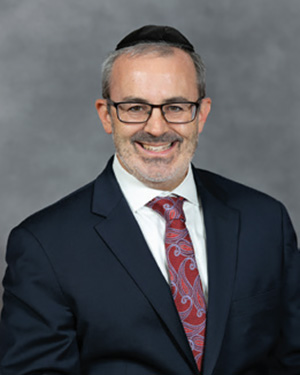
The American Dream was finally unveiled on October 25, 2019. After years of painstaking planning, the mega shopping/dining/entertainment mecca opened its doors to flocks of awaiting consumers. Full disclosure: while I wasn’t present for the grand opening, I do intend to make my way there at some point. Why? First, I am innately curious. Second, I enjoy new experiences. Third, they will feature a kosher food court!
I can’t help but think about what would be considered the Jewish American dream. Of course, we as a people eagerly await the final redemption and look forward to all of us returning to the Land of Israel. Yet, for nearly 2,000 years, what has sustained and uplifted our people through countless countries and exiles? Clearly, it is something other than roller coasters, fashion trends and pulled beef sandwiches.
Avraham Avinu, as we will be reading the next few weeks, dreamed of a vastly different world. As the father of monotheism, he introduced the very concept of a faith-based society to humanity. For years he pined for a child to partner with him in his quest to educate his contemporaries about emunah, and ultimately succeed him as the prime communicator of his essential message. Finally, after suffering years of ridicule and scorn, he is granted his wish, only to have Hashem test him with the ultimate sacrifice in the akeidah.
Rabbi Soloveitchik marvels at Avraham’s complacency, sense of calm and peace of mind during the test of the akeidah. Even beyond the enormity of the act itself, the Rav explains, was the unusual equanimity with which Avraham approached this command. At no point do we find Avraham arguing with God or pleading for mercy.
How did Avraham develop that sense of emunah, and more fundamentally, how can we, as parents, help cultivate emunah in our own children?
Many have noted that developing emunah is more experiential than rational. In a short essay entitled “The Source of Faith is Faith Itself,” Rav Aharon Lichtenstein describes the profound impact his parents’ faith had upon him growing up in their home. He writes that while each of his parents “habitually raised serious questions about the religious world…they always radiated a sense of profoundly engaged commitment.” Rav Lichtenstein recalls that at home he “received trust and strength” as well as much of his religious consciousness that was further nurtured in later years by his rebbeim.
This reflection about receiving a foundation in faith first from the home is echoed by Rabbi Soloveitchik, most famously in his eulogy “A Tribute to the Rebbetzin of Talne” delivered at the conclusion of her shesholim. When describing the impact of his own mother, the Rav writes, “Most of all I learned that Judaism expresses itself not only in formal compliance with the law but also in a living experience. She [my mother] taught me that there is a flavor, a scent and warmth to mitzvot. I learned from her the most important thing in life—to feel the presence of the Almighty and the gentle pressure of His hand resting upon my frail shoulders.” In particular, the Rav describes how his mother taught him how to live Shabbat, “experience her presence, and perceive her beauty and splendor.”
Evidently, parents represent the primary role models in presenting their children with a faith-infused life, a reality supported by much of modern research. Children observe how their parents act, behave and respond to various life situations. We, as parents, can shape and build belief through carefully elevating events that happen around us on constant basis. A few examples:
Nature: Having just returned from a three-day leadership hiking retreat with our seventh graders, I can attest to the inspiring effect that nature can have on children of all ages. Exposing children to the spectacular world God has created for us provides ample opportunities for spiritual reflection. During this time of year, when we pass colorful foliage, we can exclaim how beautiful Hashem’s world is! Similarly, studying the miracles of the human body and the animal kingdom can bring us closer to the Creator.
Yad Hashem: Students respond to real-life stories where they can see Hashem’s hand guiding them in their everyday lives. This is a trait that can be modeled and developed. Imagine if every Friday night, each family member was asked to share an example where he/she saw Hashem’s hand in the prior week. Before long, children will start to notice God’s involvement in our lives multiple times per week and will have to decide which of many stories to share first.
Shabbos Table: Speaking of Shabbos in general, our Shabbos table represents a prime opportunity to engage our children in religious life. Yet, as Rabbi Shlomo Wolbe cautions in his seminal work on parenting “Zeriyah U’Binyan BeChinuch,” we need to remain forever conscious of the age and interests of our children. It isn’t reasonable to expect our children to sit at the Shabbos table for hours, especially if the conversation does not involve or engage them. The Shabbos table can involve laughter, games for younger children, songs and age-appropriate stories so the children look forward to it with excitement each week. Shabbos is the anchor of our emunah and children can learn to gradually enjoy and appreciate it for all of its blessings and opportunities.
Talking God: Finally, much has been written about bringing God back into the conversation. While we may spend time talking with our children about mitzvah performance, Torah study and development of character, how often do we link those discussions back to developing a relationship with our Creator? Ultimately, we dream that each of our children will develop a meaningful and personal relationship with God. By purposefully talking about God with our children we help our children grow in their emunah and God awareness.
May all of our dreams come to fruition and may the Almighty bless us in our efforts to build lasting emunah in our children.
Rabbi Jonathan Knapp is head of school at Yavneh Academy.








